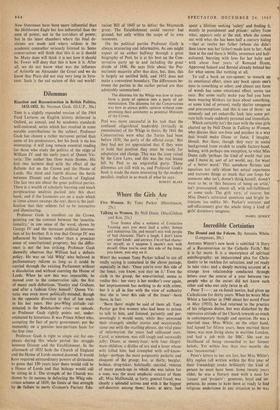Where the Girls Are
Five Women. By Tony Parker. (Hutchinson, 25s.) Talking to Women. By Nell Dunn. (MacGibbon and Kee, 21s.) Your licence after a sentence of Corrective Training says you must lead a sober, honest and industrious life, and mustn't mix with people of bad character. That's a laugh, I don't know any other kinds: and anyway, I'm of bad charac- ter myself, so I suppose 1 mustn't mix with myself. Once you're over this side of the fence, you know, you stay on it.
WHAT the women Tony Parker talked to are all really saying is contained in the above passage, especially in that: `Once you're over this side of the fence, you know, you stay on it.' Even the sixth in the group, the non-criminal, seems to realise this: her story is her mother's over again, her imprisonment has nothing to do with crime, but it is all in line with the view of authority that she is `over this side of the fence'--born there, in fact.
`Born there' might be said of them all. Tony Parker got five women who had been to prison to talk to him, and listened, patiently and per- severingly it would seem, while they unwound their strangely similar stories and occasionally came out with the startling phrase, the vital piece of information the years had calloused over. Carol, at nineteen, was still tough and outwardly jolly; Diane, at twenty-four, with four illegiti- mate children, a dislike of sex and a lover whose wife killed him, had crumpled with self-know- ledge—perhaps the most poignantly pathetic and eloquent of the group; Joe, at thirty, burglar, lesbian, drug-taker, habitually suicidal, veteran of many punch-ups in which she was taken for a man, was the most emphatic outcast of them all; Miss McDonald, at forty, genteel fraud, was clearly a splendid actress and with it the-biggest self-deceiver among them; Janie, at sixty, had spent a lifetime seeking 'safety' and finding it, mostly in punishment and prison: safety from what, appears only at the end, when she comes out with what she has been half a century hiding —that at twelve her father (whom she didn't then know was her father) made love to her. And then at the end there is Millie, seventeen and half- coloured, bursting with love for her baby and with about four years of Remand Home, Approved School and Borstal already behind her for what seems like nothing at all.
To call a book an eye-opener, to remark on its emotional effect, since any book opens one's eyes to something or other, and almost any form of words has some emotional effect, seems too easy. But some really make you feel you have been wearing blinkers (at least about something, or some kind of person), really shatter smugness and preconceptions, and this is one of them: an intensely sad yet unhorrific look into some pri- vate hells made suddenly personal and immediate.
Which certainly isn't the case with the nine girls chatted up by Nell Dunn in Talking to Women, who discuss their sex-lives and psyches in a way that would make Diane or Janie, I imagine, blench. But these, though they vary in social background from ex-deb to cradle factory-hand, belong, with perhaps one exception, to what Miss -Dunn calls 'perhaps the kind of world that you and I move in, sort of art world, say, for want of a better word.' This somehow flattens and equalises not only idiom but actual experience and narrows things so much that one longs for someone who isn't, doesn't think herself, doesn't want to be, in 'this business of being an artist,' isn't preoccupied, above all, with self-fulfilment or some such. The girls vary, of course; but Miss Dunn's reiterated questions and bright in- trusions (so unlike Mr. Parker's restraint and self-effacement) give the whole thing a kind of girls' dormitory snugness.
ISABEL QUIGLY'






























 Previous page
Previous page